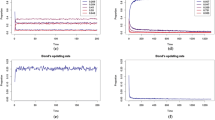Abstract
Probabilistic Cellular Automata generalise CA by implementing an updating rule defined through a probability. It means a synchronous updating of the constituting cells/sites’ states is possible. PCA differ from the interacting particle systems where in general at most one site is possibly updated at a time. For a family of reversible (in a stochastic sense) PCA dynamics, we study through numerical simulations the effective flips occurring. When infinitely many sites are considered, there are two regime: an ergodic one and a phase transition regime. When finitely many interacting sites are considered, these regimes corresponds to very different effective parallelism rate. We quantify these changes. When phase transition holds, PCA dynamics is in fact an α-asynchronous one.
Access this chapter
Tax calculation will be finalised at checkout
Purchases are for personal use only
Preview
Unable to display preview. Download preview PDF.
Similar content being viewed by others
References
Kari, J.: Theory of cellular automata: a survey. Theoret. Comput. Sci. 334(1-3), 3–33 (2005)
Cervelle, J., Dennunzio, A., Formenti, E., Skowron, A.: Cellular Automata and Models of Computation. Fundamenta Informaticae 126(2-3) (2013)
Liggett, T.M.: Interacting particle systems. Springer, New York (1985)
Fatès, N.: Asynchronism induces second-order phase transitions in elementary cellular automata. J. Cell. Autom. 4(1), 21–38 (2009)
Fatés, N., Morvan, M., Schabanel, N., Thierry, É.: Fully asynchronous behavior of double-quiescent elementary cellular automata. In: Jedrzejowicz, J., Szepietowski, A. (eds.) MFCS 2005. LNCS, vol. 3618, pp. 316–327. Springer, Heidelberg (2005)
Regnault, D., Schabanel, N., Thierry, C.: Progresses in the analysis of stochastic 2D cellular automata: a study of asynchronous 2D minority. Theoret. Comput. Sci. 410(47-49), 4844–4855 (2009)
Derrida, B.: Dynamical phase transitions in spin models and automata. In: Fundamental Problems in Statistical Mechanics VII (Altenberg, 1989), pp. 273–309. North-Holland, Amsterdam (1990)
Dai Pra, P., Louis, P.Y., Roelly, S.: Stationary measures and phase transition for a class of Probabilistic Cellular Automata. ESAIM: Probability & Statistics 6, 89–104 (2002)
Cirillo, E.N., Nardi, F.R., Spitoni, C.: Metastability for Reversible Probabilistic Cellular Automata with Self-Interaction. J. Statist. Phys. 132(3), 431–471 (2008)
Nardi, F.R., Spitoni, C.: Sharp Asymptotics for Stochastic Dynamics with Parallel Updating Rule with self-interaction. Journ. Stat. Phys. 4(146), 701–718 (2012)
Cirillo, E.N., Louis, P.Y., Ruszel, W.M., Spitoni, C.: Effect of self-interaction on the phase diagram of a Gibbs-like measure derived by a reversible Probabilistic Cellular Automata. Chaos, Solitons & Fractals (December 2013)
Dai Pra, P., Scoppola, B., Scoppola, E.: Sampling from a Gibbs Measure with Pair Interaction by Means of PCA. Journal of Statistical Physics 149(4), 722–737 (2012)
Lancia, C., Scoppola, B.: Equilibrium and Non-equilibrium Ising Models by Means of PCA. Journal of Statistical Physics 153(4), 641–653 (2013)
Kozlov, O., Vasilyev, N.: Reversible Markov chains with local interaction. In: Multicomponent Random Systems, pp. 451–469. Dekker, New York (1980)
Louis, P.Y.: Automates Cellulaires Probabilistes: mesures stationnaires, mesures de Gibbs associées et ergodicité. PhD thesis, Politecnico di Milano, Italy and Université Lille 1, France (September 2002)
Louis, P.Y.: Ergodicity of PCA: Equivalence between Spatial and Temporal Mixing Conditions. Electronic Communications in Probability 9, 119–131 (2004)
Georgii, H.O.: Gibbs Measures and Phase Transitions. De Gruyter, Berlin (2011)
Author information
Authors and Affiliations
Editor information
Editors and Affiliations
Rights and permissions
Copyright information
© 2014 Springer International Publishing Switzerland
About this paper
Cite this paper
Louis, PY. (2014). Effective Parallelism Rate by Reversible PCA Dynamics. In: Wąs, J., Sirakoulis, G.C., Bandini, S. (eds) Cellular Automata. ACRI 2014. Lecture Notes in Computer Science, vol 8751. Springer, Cham. https://doi.org/10.1007/978-3-319-11520-7_61
Download citation
DOI: https://doi.org/10.1007/978-3-319-11520-7_61
Publisher Name: Springer, Cham
Print ISBN: 978-3-319-11519-1
Online ISBN: 978-3-319-11520-7
eBook Packages: Computer ScienceComputer Science (R0)




